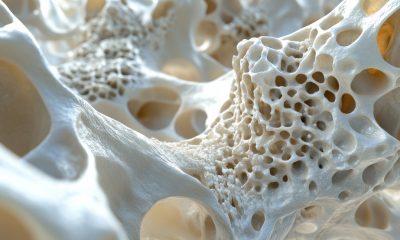Leadership
Weight-loss focus may harm obesity patients, experts warn

Focusing only on weight loss in people with obesity could cause more harm than good, medical experts have said.
Standard advice to eat less and exercise more often fails to deliver sustained weight loss and may reinforce harmful weight stigma.
Although widely promoted, these strategies have shown limited long-term benefits for reducing events such as heart attacks or strokes.
The BMJ commentary, published by Dr Juan Franco and colleagues, argues that body weight alone is a poor measure of health.
Instead, they call for care tailored to individual needs and based on the best available evidence, regardless of a person’s size.
For decades, people with a high body mass index (BMI) — a calculation of weight in relation to height — have been advised to cut calories and increase physical activity.
But studies show these efforts rarely lead to lasting weight change.
The authors also warn that a strong focus on weight can fuel bias — negative attitudes and assumptions based on body size — which has been linked to poorer mental health, disordered eating, and even weight gain.
They highlight growing interest in alternative approaches such as Health at Every Size (HAES), which focus on improving health behaviours without aiming for weight loss.
These models have shown encouraging results in changing eating patterns and supporting wellbeing.
The authors wrote: “Doctors should be prepared to inform individuals seeking weight loss about the potential benefits and harms of interventions and minimise the risk of developing eating disorders and long term impacts on metabolism.
“Such a patient centred approach is likely to provide better care by aligning with patient preferences and circumstances while also reducing weight bias.”
While more large-scale studies are needed, the authors suggest these models offer useful lessons for clinicians aiming to provide respectful, personalised care.
They concluded: “Doctors’ advice about healthy eating and physical activity is still relevant as it may result in better health.
“The main goal is to offer good care irrespective of weight, which means not caring less but rather discussing benefits, harms, and what is important to the patient.”
News
US$100m UK tech entrepreneurs shift focus from real estate to longevity

Whilst running a US$100m-a-year technology business Paul Statham and his team turned their attention to longevity.
Speaking to Agetech World the London-based entrepreneur took up the story: “ I travel extensively and the only way I could keep in touch with my late mother Kathy, who was suffering from dementia, was through the telephone.
“But an hour’s phone call is not the same for someone who wants people around her more of the time, that resonated with me and so we decided to look at the problem and find a solution.”
This led to the foundation of the home-based technology smart speaker Sentai, which provides domestic companionship and assistance for those of advancing years.
Back in 2021 the Sentai team secured £172,568 from quango Innovate UK and Statham and his team have since invested ‘several million pounds’ of their own money bringing Sentai to fruition.
What is Sentai?
Statham elaborated: “Sentai is a smart speaker which uses AI to communicate and support older adults in their daily tasks. It acts as a digital companion as well as a digital assistant.

Paul Statham
“In the assistant space it will provide daily reminders of tasks and appointments, and from the companion perspective, it will engage in conversation.
“The AI technology available now is truly phenomenal; unbelievably clever. It is able to get to know the person it is talking to and truly does become part of their world.
“Sentai is there to support and help people; it doesn’t take over their lives but works as part of their life. It gets to know people and can play games, deliver medical reminders, or, for example, assist with reminder prompts on things such as ensuring their drinking enough water or getting enough exercise.
“As we age, we need more care, but many elderly people are becoming isolated and spending less time with their families, so we came up with the idea of using this technology to help provide additional support.”
What is the potential of Sentai?
Trials of the first Sentai began over the summer with the company looking to launch in January 2026.
It has a number of primary target markets in its sights with the potential to save taxpayers and home care organisations many millions of pounds.
Statham continued: “There’s the retail/consumer market. We’re selling Sentai through the internet, and other primary marketing channels.
“Then there’s the domiciliary care market; companies and organisations who provide home care for people.
“Sentai is a great help to these organisations and they are potentially prime users of the product as it allows them to provide additional hours of coverage with slimmed-down costs.
“In the UK it’s difficult to find domestic care workers, there are not enough as it is, and demand is set to increase. So the domiciliary care market is a massive opportunity and we are really leaning into this.”
Sentai is working with a number of local authorities delivering home care and it is also currently involved in a trial with an NHS Trust in South East which permits two-way communications between a patient and the hospital.
“When patients leave hospital, if they’ve not got a loved one or a family member to stay with them, then they will take a Sentai home. This will allow the hospital to assess their progress and make sure their needs are being met.
“We’ve got various councils piloting Sentai for assisted living in trials which allow the care providers to monitor a patient’s needs with the view of developing Sentai as a concierge service.”
While some trial users have been found to use Sentai more than expected others have been less verbose, and, so, over time the AI speaker is able to familiarise itself with its user’s personalities and deliver ‘concise’ or ‘chatty’ modes depending on individual preferences.
At £29.50 (US’$39) per month, or £294 (US$387) annually for use of the speaker and app, Sentai’s pricing makes the technology relatively accessible.

Keeping families connected
Statham and his team founded their previous company Condeco Software twenty years ago.
It had developed into a leading global player in workspace management and resource scheduling, effectively ensuring the real estate footprint of a company matched its needs.
As the pandemic shifted workspace requirements Condeco’s software made it one of the leading players in its field.
By late 2022, as the company’s annual revenues topped US$100m, it was sold in a private equity deal for an undisclosed sum, with some of this money now being ploughed into Sentai.
Statham added: “We launched our product because we were thinking of our own loved ones and how we wanted to stay in contact with them.
“That is the DNA of the business. We want to keep families connected and keep older adults relevant and help them live independently for longer.
“If we can help with loneliness and companionship, and help connect families to their loved ones, then that will be an unbelievable success.”
Leadership
Researcher wins grant for tissue ageing study

A university researcher has received a grant of up to US$150,000 to study how bone fractures may accelerate tissue ageing and test potential treatments.
Dr Madison Doolittle, assistant professor in the Center for Regenerative Medicine and Skeletal Development at the UConn School of Dental Medicine, recently received the funding from the American Federation for Aging and Research (AFAR).
AFAR’s Grants for Junior Faculty Program provides up to US$150,000 to junior faculty for one to two years to conduct research that will form the basis for longer-term work on the biology of ageing.
“I am thrilled to receive this award from AFAR,” said Doolittle. “At a time where research funding is in such jeopardy, I am incredibly thankful to AFAR for providing this award so that we can continue to study the complicated nature of biological ageing in the skeleton.”
The funding will allow Doolittle’s lab to study injury as a catalyst for accelerated skeletal tissue ageing. After breaking a bone, lingering symptoms such as pain, stiffness and arthritis can occur, and this can increasingly worsen with age.
Clinical data show that a previous bone fracture, regardless of age, can increase the risk of fracture in old age. Based on these factors, it is believed that previously fractured bones age faster than non-fractured bones, resulting in accelerated bone loss driven by higher proportions of aged “senescent” cells.
Senescent cells are cells that have stopped dividing but remain in the body, releasing substances that can damage surrounding tissue and speed up ageing processes.
This award will allow Doolittle to study this phenomenon in mouse models and test a potential therapeutic approach to correct premature ageing in both bone and systemic tissues.
“What I’m most looking forward to is the effect these findings may have on eventual clinical applications, as fractures in the elderly are one of the most catastrophic events regarding frailty and loss of independence,” said Doolittle. “In future projects, it would be interesting to see if this occurs in other tissues as well, which would implicate injury as a universal driver of premature ageing.”
The goal of the Grants for Junior Faculty Program is to assist in the development of the careers of early-career investigators committed to pursuing careers in ageing research.
“A core grant programme since AFAR’s inception, the AFAR Grant for Junior Faculty provides flexible support at a critical juncture in an early career investigator’s career when research funding is most difficult to secure,” notes Stephanie Lederman, executive director of AFAR. “This grant has helped many promising scientists advance the field’s understanding the basic mechanisms of ageing, building a foundation of knowledge that will help us all live healthier, longer.”
News
UCR scientist wins AFAR grant for immune ageing

Huimin Zhang of UC Riverside has received a 2025 AFAR Grant for Junior Faculty to study immune ageing, one of six awards this year.
The Grants for Junior Faculty programme provides up to US$150,000 to junior faculty for one to two years to support research that will underpin longer-term work on the biology of ageing.
“This grant has helped many promising scientists advance the field’s understanding of the basic mechanisms of ageing, building a foundation of knowledge that will help us all live healthier, longer.” said Stephanie Lederman, executive director of AFAR.
Zhang’s research project is titled “Elucidating the role of HELIOS in epigenetic regulation of T cell ageing and TFH cell differentiation.” Her lab investigates why the immune system weakens with age, leaving older adults more vulnerable to infections and less responsive to vaccines. Her work centres on helper T cells — the “coaches” that guide B cells, the body’s antibody producers.
Her lab discovered that as people age, helper T cells lose a key protein called HELIOS, which impairs their ability to support B cells and weakens antibody responses. The lab is now testing whether restoring HELIOS can rejuvenate aged helper T cells, enhance B cell function and strengthen immune defences.
“Our ultimate goal is to design better vaccines and therapies that restore immune vitality in older adults,” Zhang said. “HELIOS appears to be a central switch controlling whether the immune system stays strong and precise or falters with age. When it declines, the immune ‘coaching system’ is out of balance.”
By restoring HELIOS in ageing T cells, Zhang’s lab hopes to strengthen how these cells support B cells and boost antibody responses. This could lead to new vaccine boosters or molecular “add-ons” that help older adults respond to infections as effectively as younger people — reducing hospitalisations from pneumonia, shingles or flu by reviving the immune system at its core.
Zhang explained that studying HELIOS also helps in understanding how ageing reshapes our epigenetics and immune function, which can assist in identifying those most at risk and reveal new ways to rejuvenate immunity. Epigenetics refers to changes in how genes are switched on or off without altering the DNA sequence.
“The key idea: ageing immunity isn’t broken — it can be reprogrammed,” she said. “In the end, our research isn’t just about ageing — it’s about rewriting its rules. By turning these insights into new vaccines and immune-reviving therapies, we aim to help older adults fight disease with the strength of youth, thus transforming the science of ageing into the medicine of longevity.”
Zhang received her doctoral degree in biochemistry and molecular biology from UCLA, followed by postdoctoral training at The Scripps Research Institute and Stanford University. She joined UCR in 2023 and is committed to mentoring the next generation of scientists at the intersection of immunology and ageing.
AFAR is a national non-profit organisation that supports and advances pioneering biomedical research.

 Wellness1 month ago
Wellness1 month agoScientists discover new anti-ageing drug class that could extend lifespan

 News3 weeks ago
News3 weeks agoUCR scientist wins AFAR grant for immune ageing

 Research2 months ago
Research2 months agoBone breakthrough could reverse osteoporosis

 Insights1 month ago
Insights1 month agoMost Americans would be considered obese under new guidelines

 Leadership2 weeks ago
Leadership2 weeks agoResearcher wins grant for tissue ageing study

 News7 days ago
News7 days agoSupplement could restore memories lost by Alzheimer’s, study finds

 News2 months ago
News2 months agoResearch uncovers ageing secrets of world’s oldest woman

 Wellness4 weeks ago
Wellness4 weeks agoJust 30 mins of light activity can boost energy and mood, study finds

































